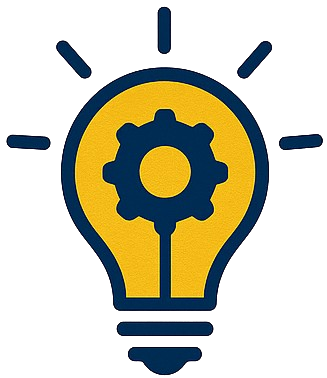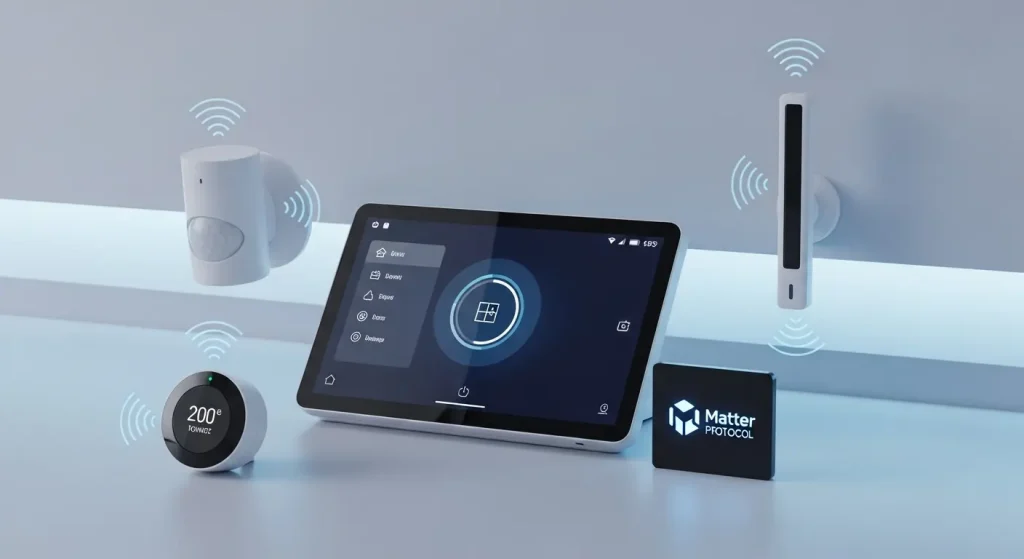Creating a truly connected smart home in 2025 requires the right foundation of essential devices. With the introduction of the Matter protocol and advanced smart home technology, building an intelligent home ecosystem has never been more accessible. This comprehensive guide explores the must-have smart home essentials that will transform your living space into a seamlessly connected environment.
Understanding Smart Home Essentials: The Foundation of Connected Living
Smart home essentials form the backbone of any successful home automation system. These core components include smart home hubs, intelligent sensors, and devices that support the revolutionary Matter protocol. Matter creates more connections between more objects, simplifies development for manufacturers, and increases compatibility for consumers, making it easier than ever to build a cohesive smart home ecosystem.
The modern smart home landscape in 2025 focuses on three critical elements: centralized control through hubs, comprehensive monitoring via sensors, and universal compatibility through Matter-enabled devices. Understanding these smart home essentials ensures you make informed decisions when investing in home automation technology.
Top Fitness Trackers & Smartwatches 2025: Ultimate Guide
The Role of Smart Home Hubs in Your Connected Ecosystem
Why Smart Home Hubs Are Essential
Smart home hubs serve as the central command center for your entire connected home network. A Matter smart home hub still handles the hard stuff. It links old and new devices. It keeps automations running even if the internet drops, providing crucial local control and reliability.
The best smart home hubs in 2025 offer several key advantages:
- Universal Device Compatibility: Modern hubs support multiple protocols including Zigbee, Z-Wave, Thread, and Wi-Fi
- Local Processing: Reduced latency and continued functionality during internet outages
- Enhanced Security: Local data processing keeps your information private
- Advanced Automation: Complex scene creation and device interaction rules
Top Smart Home Hub Options for 2025
When selecting a smart home hub, consider compatibility with your existing devices and future expansion plans. Leading options include:
SmartThings Hub: Excellent for beginners with broad device support and intuitive app interface. Supports Zigbee, Z-Wave, and Matter protocols seamlessly.
Home Assistant: Advanced users appreciate its open-source flexibility and extensive customization options. Perfect for tech-savvy homeowners wanting complete control.
Aqara Hub M2: Mix and match these devices to create an ecosystem that adds energy-efficient automation and AI-powered security features to your home, making it ideal for those prioritizing energy efficiency.
Sustainable Fashion Brands to Watch
Smart Sensors: The Eyes and Ears of Your Smart Home
Essential Smart Sensor Types
Smart sensors are fundamental smart home essentials that provide real-time data about your home environment. These devices enable automated responses and keep you informed about important changes in your living space.
Motion Sensors: Detect movement for security, lighting automation, and energy savings. Modern motion sensors offer extended battery life and precise detection angles.
Door and Window Sensors: Monitor entry points for security and automation triggers. Essential for comprehensive home monitoring systems.
Temperature and Humidity Sensors: Optimize comfort and energy efficiency by monitoring environmental conditions throughout your home.
Water Leak Sensors: Prevent costly damage by detecting moisture in vulnerable areas like basements, bathrooms, and under appliances.
Choosing the Right Smart Sensor Protocol
The protocol your smart sensors use directly impacts performance and compatibility:
- Zigbee Sensors: Zigbee also transmits data faster than Z-Wave and is better suited for more data-intensive applications
- Z-Wave Sensors: Operate on different frequencies, reducing interference with Wi-Fi networks
- Thread Sensors: The foundation for Matter devices, offering mesh networking capabilities
- Wi-Fi Sensors: Direct connection to your home network, though they may consume more power
Must-Have Tech Gadgets & Accessories in 2025: Best Budget Earbuds, Fitness Watches & Power Banks
Matter Protocol: The Future of Smart Home Compatibility
Understanding Matter’s Impact on Smart Home Essentials
Version 1.4.2 of the specification was released on 11 August 2025, bringing enhanced security and improved device support. The Matter protocol represents a significant breakthrough in smart home technology, addressing the long-standing issue of device compatibility across different brands and ecosystems.
Benefits of Matter-Enabled Smart Home Devices
Universal Compatibility: Matter-enabled devices provide easier set up, and increased compatibility and reliability, eliminating the frustration of incompatible devices.
Simplified Setup: Matter devices can be easily added to multiple platforms simultaneously, reducing configuration complexity.
Future-Proof Investment: As more manufacturers adopt Matter, your devices will remain compatible with new platforms and services.
Enhanced Reliability: Built-in redundancy and standardized communication protocols ensure consistent performance.
Top Tech Gadgets for Students Going Back to School (Fall 2025)
Building Your Smart Home Ecosystem: A Strategic Approach
Phase 1: Establish Your Foundation
Start with these core smart home essentials:
- Choose a Central Hub: Select a hub that supports your preferred protocols and future expansion plans
- Install Basic Sensors: Begin with motion sensors in high-traffic areas and door sensors on entry points
- Add Smart Lighting: Implement automated lighting controls for convenience and energy savings
Phase 2: Expand and Optimize
Once your foundation is established:
- Environmental Monitoring: Add temperature, humidity, and air quality sensors
- Security Enhancement: Install additional door/window sensors and cameras
- Energy Management: Incorporate smart thermostats and energy monitoring devices
Phase 3: Advanced Automation
Create sophisticated automation rules:
- Scene-Based Control: Program multiple devices to respond to single triggers
- Presence Detection: Use multiple sensors to determine occupancy accurately
- Energy Optimization: Implement automated climate and lighting adjustments
Understanding Credit Scores: Your Complete Guide to Better Financial Health
Smart Home Essentials: Device Recommendations by Category
Best Smart Home Hubs
| Hub | Protocols Supported | Best For | Price Range |
|---|---|---|---|
| SmartThings Hub | Zigbee, Z-Wave, Matter | Beginners | $100-150 |
| Home Assistant | All Protocols | Advanced Users | $150-300 |
| Aqara Hub M2 | Zigbee, Matter | Energy Efficiency | $60-80 |
Top Smart Sensors
Motion Sensors:
- Aqara Motion Sensor: Excellent battery life and built-in light sensor
- Philips Hue Motion Sensor: Perfect integration with Hue ecosystem
- SmartThings Motion Sensor: Reliable performance with broad compatibility
Environmental Sensors:
- Aqara Temperature/Humidity Sensor: Compact design with accurate readings
- SensorPush Wireless Sensor: Long-range connectivity and detailed app
- Eve Room: HomeKit integration with comprehensive environmental monitoring
Saving Money Strategies: 20 Proven Ways to Build Your Wealth in 2025
Troubleshooting Common Smart Home Setup Issues
Connectivity Problems
Smart home essentials occasionally experience connectivity issues. Common solutions include:
- Range Extension: Use mesh repeaters to extend signal coverage
- Interference Reduction: Zigbee using a 2.4GHz frequency, the same as Wi-Fi routers, while Z-Wave operates on 868.42 MHz, so consider protocol switching if experiencing interference
- Hub Positioning: Place hubs in central locations away from interference sources
Device Integration Challenges
When devices don’t communicate properly:
- Verify protocol compatibility between devices and hub
- Check for firmware updates on all components
- Reset and re-pair problematic devices
- Consider Matter-compatible alternatives for better integration
Future Trends in Smart Home Technology
The smart home landscape continues evolving rapidly. The wireless protocol your chosen device uses no longer matters as much as it once did thanks to Matter’s universal compatibility approach. Expect to see:
Enhanced AI Integration: Smarter automation based on learning user preferences and patterns
Improved Energy Management: More sophisticated systems for optimizing home energy consumption
Advanced Security Features: Integrated AI-powered threat detection and response systems
Seamless Voice Control: Better natural language processing for intuitive device interaction
Blog Post: Yoga, Breathwork and Sleep Improvement
Frequently Asked Questions
What are the most essential smart home devices for beginners?
The essential smart home devices for beginners include a central hub (like SmartThings or Home Assistant), basic motion sensors, door/window sensors, and smart lighting. These smart home essentials provide immediate benefits in convenience, security, and energy savings while establishing a foundation for future expansion.
How does the Matter protocol improve smart home compatibility?
The Matter protocol creates universal compatibility between smart home devices regardless of manufacturer. Matter-enabled devices can work with multiple platforms simultaneously, simplifying setup and ensuring your smart home essentials remain compatible as you add new devices or change ecosystems.
Which smart sensor protocol is best for my home?
The best smart sensor protocol depends on your specific needs. Zigbee offers fast data transmission and wide device selection, Z-Wave provides excellent range and reduced Wi-Fi interference, while Thread/Matter sensors offer future-proof compatibility. Consider your existing hub capabilities and device ecosystem when choosing.
Start Building Your Smart Home Today
Ready to transform your home with these smart home essentials? The key to success lies in starting with quality foundational devices and gradually expanding your system. Focus on hubs that support multiple protocols, reliable sensors from established manufacturers, and Matter-compatible devices for future-proof compatibility.
Smart speakers (Amazon Echo, Google Nest) :
Smart bulbs/plugs (Philips Hue, TP-Link Kasa) :
– Shop the latest smart home hubs, sensors, and Matter-enabled devices to begin your connected home journey.










